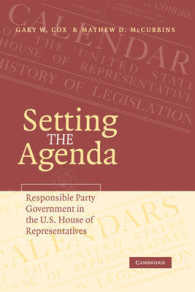Full Description
The Late Modern period is the first in the history of English for which an unprecedented wealth of textual material exists. Using increasingly sophisticated databases, the contributions in this volume explore grammatical usage from the period, specifically morphological and syntactic change, in a broad context. Some chapters explore the socio-historical background of the period while others provide information on prescriptivism, newspaper language, language contact, and regional variation in British and American English. Internal processes of change are discussed against grammaticalisation theory and construction grammar and the rich body of textual evidence is used to draw inferences on the precise nature of historical change. Exposing readers to a wealth of data that informs the description of a broad range of syntactic phenomena, this book is ideal for graduate students and researchers interested in historical linguistics, corpus linguistics and language development.
Contents
1. Introduction. Late Modern English syntax in its linguistic and socio-historical context Marianne Hundt; Part I. Changes in the VP: 2. The decline of the BE-perfect, linguistic relativity, and grammar writing in the nineteenth century Lieselotte Anderwald; 3. Let's not, let's don't and don't let's in British and American English Anita Auer; 4. Do we got a difference? Divergent developments of semi-auxiliary (have) got (to) in British and American English Christian Mair; 5. From contraction to construction? The recent life of 'll Nadja Nesselhauf; 6. Books that sell - mediopassives and the modification 'constraint' Marianne Hundt; Part II. Changes in the NP: 7. Beyond mere syntactic change: a micro-analytical study of various and numerous Tine Breban; 8. Culturally conditioned language change? A multivariate analysis of genitive constructions in ARCHER Benedikt Szmrecsanyi, Anette Rosenbach, Joan Bresnan and Christoph Wolk; Part III. Changes in Complementation Patterns: 9. On the changing status of that-clauses Günter Rohdenburg; 10. Variability in verb complementation in Late Modern English: finite vs non-finite patterns Hubert Cuyckens, Frauke D'Hoedt and Benedikt Szmrecsanyi; Part IV. Category Change: 11. Opposite developments in composite predicate constructions: the case of take advantage of and make use of Eva Berlage; 12. Constrained confusion: the gerund/participle distinction in Late Modern English Hendrik De Smet; 13. 'You are a bit of a sneak': exploring a degree modifier in the Old Bailey Corpus Claudia Claridge and Merja Kytö; Part V. The Syntax-Pragmatics Interface: 14. If you choose/like/prefer/want/wish: the origin of metalinguistic and politeness functions Laurel J. Brinton; 15. Epistemic parentheticals with seem: Late Modern English in focus María José López-Couso and Belén Méndez-Naya; Part VI. Text-Type Related Change: 16. Syntactic stability and change in nineteenth-century newspaper language Erik Smitterberg; Part VII. Language Contact and Syntactic Change: 17. '(W)ell are you not got over thinking about going to ireland yet': the BE-perfect in eighteenth- and nineteenth-century Irish English Kevin McCafferty.







